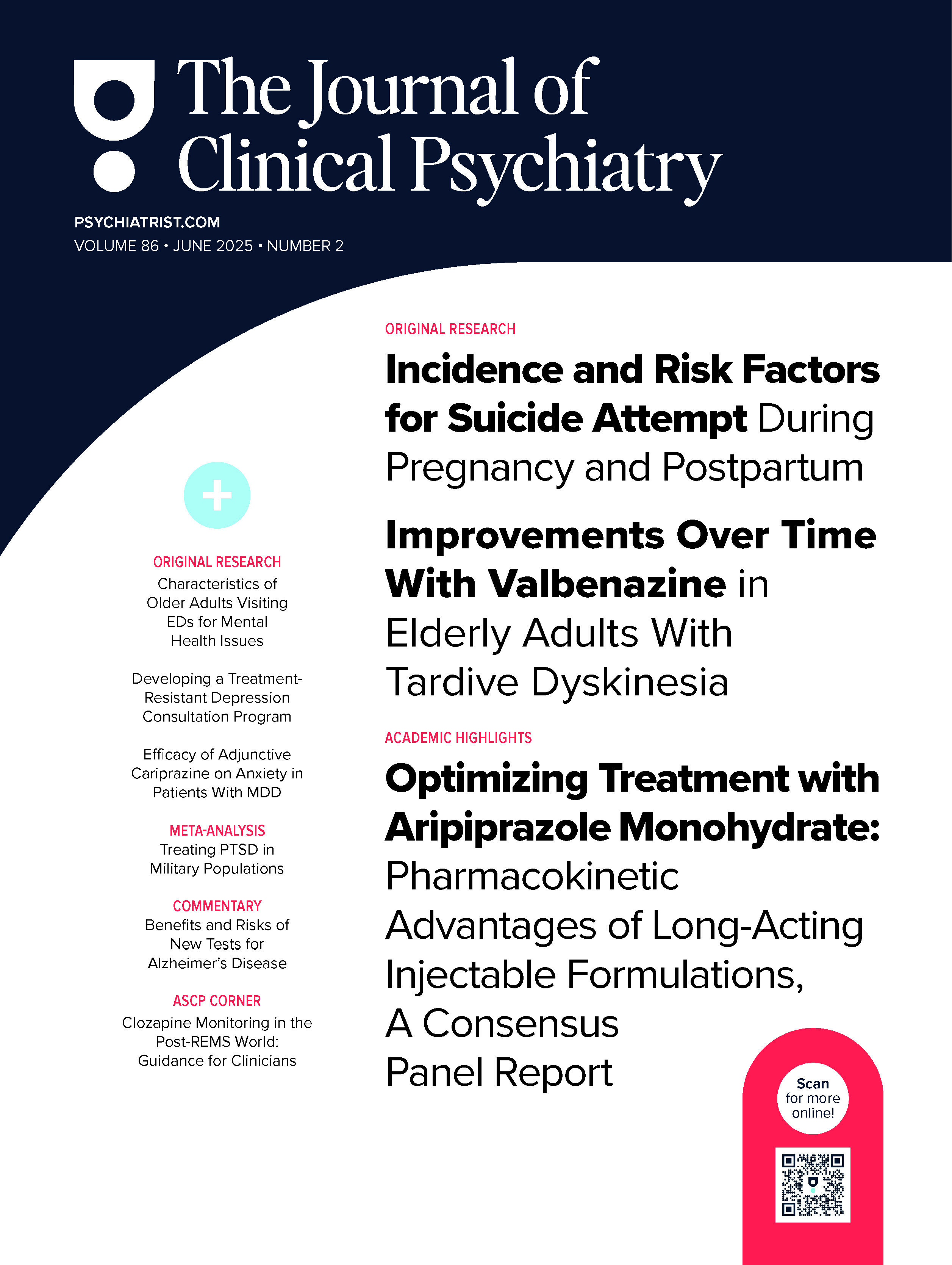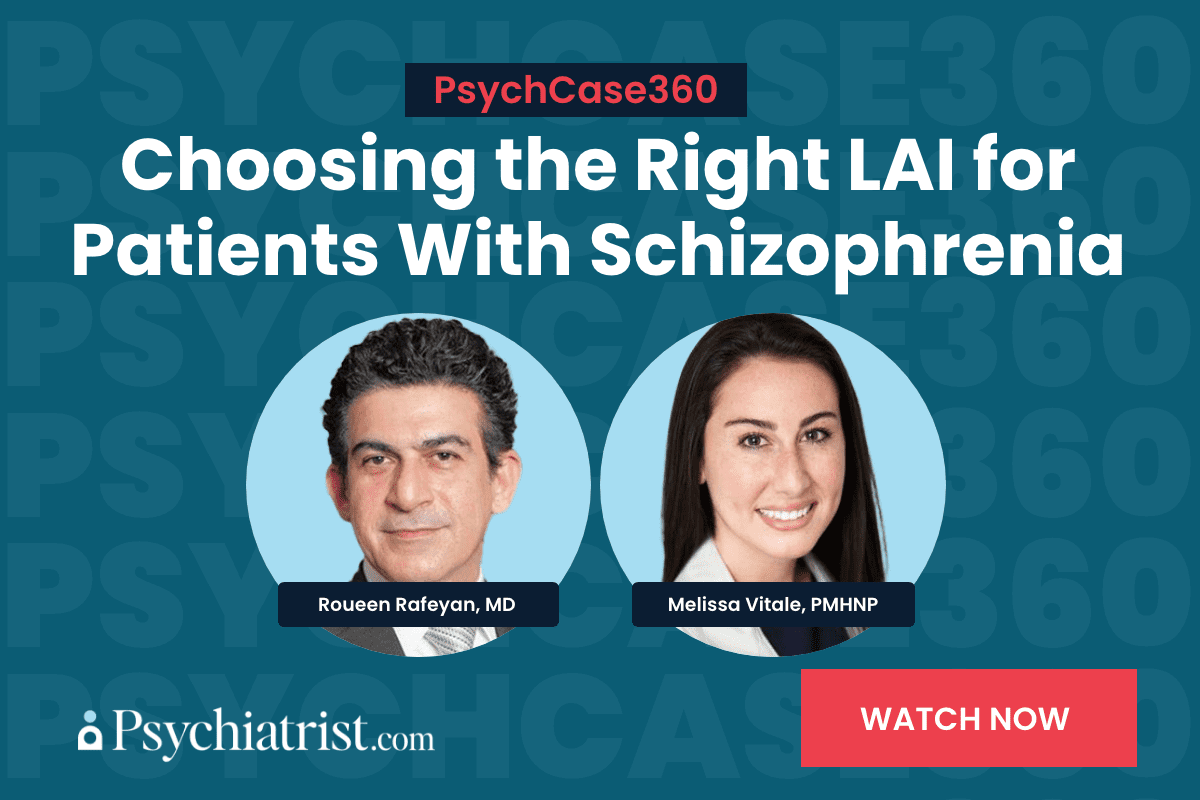ABSTRACT
Background: Quality of life (QoL) is an important patient-centric outcome to evaluate in treatment of major depressive disorder (MDD). This work sought to investigate the performance of several machine learning methods to predict a return to normative QoL in patients with MDD after antidepressant treatment.
Methods: Several binary classification algorithms were trained on data from the first 2 weeks of the Sequenced Treatment Alternatives to Relieve Depression (STAR*D) study (n = 651, conducted from 2001 to 2006) to predict week 9 normative QoL (score ≥ 67, based on a community normative sample, on the Quality of Life Enjoyment and Satisfaction Questionnaire–Short Form [Q-LES-Q-SF]) after treatment with citalopram. Internal validation was performed using a STAR*D holdout dataset, and external validation was performed using the Canadian Biomarker Integration Network in Depression-1 (CAN-BIND-1) dataset (n = 175, study conducted from 2012 to 2017) after treatment with escitalopram. Feature importance was calculated using SHapley Additive exPlanations (SHAP).
Results: Random Forest performed most consistently on internal and external validation, with balanced accuracy (area under the receiver operator curve) of 71% (0.81) on the STAR*D dataset and 69% (0.75) on the CAN-BIND-1 dataset. Random Forest Classifiers trained on Q-LES-Q-SF and Quick Inventory of Depressive Symptomatology–Self-Rated variables had similar performance on both internal and external validation. Important predictive variables came from psychological, physical, and socioeconomic domains.
Conclusions: Machine learning can predict normative QoL after antidepressant treatment with similar performance to that of prior work predicting depressive symptom response and remission. These results suggest that QoL outcomes in MDD patients can be predicted with simple patient-rated measures and provide a foundation to further improve performance and demonstrate clinical utility.
Trial Registration: ClinicalTrials.gov identifiers NCT00021528 and NCT01655706
J Clin Psychiatry 2024;85(1):23m14864
Author affiliations are listed at the end of this article.
Members Only Content
This full article is available exclusively to Professional tier members. Subscribe now to unlock the HTML version and gain unlimited access to our entire library plus all PDFs. If you’re already a subscriber, please log in below to continue reading.
References (40)

- Herrman H, Kieling C, McGorry P, et al. Reducing the global burden of depression: a Lancet-World Psychiatric Association Commission. Lancet. 2019;393(10189):e42–e43. PubMed CrossRef
- Malhi GS, Mann JJ. Depression. Lancet. 2018;392(10161):2299–2312. PubMed CrossRef
- Brenes GA. Anxiety, depression, and quality of life in primary care patients. Prim Care Companion J Clin Psychiatry. 2007;9(6):437–443. PubMed CrossRef
- Wells KB, Sherbourne CD. Functioning and utility for current health of patients with depression or chronic medical conditions in managed, primary care practices. Arch Gen Psychiatry. 1999;56(10):897–904. PubMed CrossRef
- IsHak WW, Greenberg JM, Cohen RM. Predicting relapse in major depressive disorder using patient-reported outcomes of depressive symptom severity, functioning, and quality of life in the Individual Burden of Illness Index for Depression (IBI-D). J Affect Disord. 2013;151(1):59–65. PubMed CrossRef
- Schechter D, Endicott J, Nee J. Quality of life of ‘normal’ controls: association with lifetime history of mental illness. Psychiatry Res. 2007;152(1):45–54. PubMed CrossRef
- Morton E, Bhat V, Giacobbe P, et al; CAN-BIND Investigator Team. Impacts on quality of life with escitalopram monotherapy and aripiprazole augmentation in patients with major depressive disorder: A CAN-BIND report. Pharmacopsychiatry. 2021;54(5):225–231. PubMed CrossRef
- Morton E, Michalak EE, Levitt A, et al. Quality of life impacts of bright light treatment, fluoxetine, and the combination in patients with nonseasonal major depressive disorder: a randomized clinical trial. Can J Psychiatry. 2021;66(3):289–297. PubMed CrossRef
- Solomon DA, Leon AC, Endicott J, et al. Psychosocial impairment and recurrence of major depression. Compr Psychiatry. 2004;45(6):423–430. PubMed CrossRef
- IsHak WW, Greenberg JM, Balayan K, et al. Quality of life: the ultimate outcome measure of interventions in major depressive disorder. Harv Rev Psychiatry. 2011;19(5):229–239. PubMed CrossRef
- Machado-Vieira R, Baumann J, Wheeler-Castillo C, et al. The timing of antidepressant effects: a comparison of diverse pharmacological and somatic treatments. Pharmaceuticals (Basel). 2010;3(1):19–41. PubMed CrossRef
- Ermers NJ, Hagoort K, Scheepers FE. The predictive validity of machine learning models in the classification and treatment of major depressive disorder: state of the art and future directions. Front Psychiatry. 2020;11:472. PubMed CrossRef
- Sajjadian M, Lam RW, Milev R, et al. Machine learning in the prediction of depression treatment outcomes: a systematic review and meta-analysis. Psychol Med. 2021;51(16):2742–2751. PubMed CrossRef
- Cabitza F, Campagner A, Soares F, et al. The importance of being external. methodological insights for the external validation of machine learning models in medicine. Comput Methods Programs Biomed. 2021;208:106288. PubMed CrossRef
- Rush AJ, Fava M, Wisniewski SR, et al; STAR*D Investigators Group. Sequenced Treatment Alternatives to Relieve Depression (STAR*D): rationale and design. Control Clin Trials. 2004;25(1):119–142. PubMed CrossRef
- Kennedy SH, Lam RW, Rotzinger S, et al; CAN-BIND Investigator Team. Symptomatic and functional outcomes and early prediction of response to escitalopram monotherapy and sequential adjunctive aripiprazole therapy in patients with major depressive disorder: A CAN-BIND-1 report. J Clin Psychiatry. 2019;80(2):18m12202. PubMed CrossRef
- Rush AJ, Trivedi MH, Ibrahim HM, et al. The 16-Item Quick Inventory of Depressive Symptomatology (QIDS), clinician rating (QIDS-C), and self-report (QIDS-SR): a psychometric evaluation in patients with chronic major depression. Biol Psychiatry. 2003;54(5):573–583. PubMed CrossRef
- Lam RW, Milev R, Rotzinger S, et al; CAN-BIND Investigator Team. Discovering biomarkers for antidepressant response: protocol from the Canadian biomarker integration network in depression (CAN-BIND) and clinical characteristics of the first patient cohort. BMC Psychiatry. 2016;16(1):105. PubMed CrossRef
- Battle DE. Diagnostic and Statistical Manual of Mental Disorders (DSM). CoDAS. 2013;25(2):191–192. PubMed
- Montgomery SA, Asberg M. A new depression scale designed to be sensitive to change. Br J Psychiatry. 1979;134(4):382–389. PubMed CrossRef
- Endicott J, Nee J, Harrison W, et al. Quality of Life Enjoyment and Satisfaction Questionnaire: a new measure. Psychopharmacol Bull. 1993;29(2):321–326. PubMed
- IsHak WW, Mirocha J, James D, et al. Quality of life in major depressive disorder before/after multiple steps of treatment and one-year follow-up. Acta Psychiatr Scand. 2015;131(1):51–60. PubMed CrossRef
- Fayers PM, Machin D. Quality of Life: The Assessment, Analysis and Interpretation of Patient-Reported Outcomes. John Wiley & Sons; 2013.
- IsHak WW, Mirocha J, Pi S, et al. Patient-reported outcomes before and after treatment of major depressive disorder. Dialogues Clin Neurosci. 2014;16(2):171–183. PubMed CrossRef
- Nunez JJ, Nguyen TT, Zhou Y, et al. Replication of machine learning methods to predict treatment outcome with antidepressant medications in patients with major depressive disorder from STAR*D and CAN-BIND-1. PLoS One. 2021;16(6):e0253023. PubMed CrossRef
- Harris CR, Millman KJ, van der Walt SJ, et al. Array programming with NumPy. Nature. 2020;585(7825):357–362. PubMed CrossRef
- McKinney W. pandas: a foundational Python library for data analysis and statistics. Python High Performance Science Computer. 2011;14(9):1-9.
- Nie Z, Vairavan S, Narayan VA, et al. Predictive modeling of treatment resistant depression using data from STAR*D and an independent clinical study. PLoS One. 2018;13(6):e0197268. PubMed CrossRef
- Pedregosa F, Varoquaux G, Gramfort A, et al. Scikit-learn: machine learning in python. J Machine Learn Res. 2011;12:2825–2830.
- Chekroud AM, Zotti RJ, Shehzad Z, et al. Cross-trial prediction of treatment outcome in depression: a machine learning approach. Lancet Psychiatry. 2016;3(3):243–250. PubMed CrossRef
- Kautzky A, Baldinger-Melich P, Kranz GS, et al. A new prediction model for evaluating treatment-resistant depression. J Clin Psychiatry. 2017;78(2):215–222. PubMed CrossRef
- Lundberg SM, Lee SI. A Unified Approach to Interpreting Model Predictions. In: Advances in Neural Information Processing Systems. Vol 30. Curran Associates, Inc; 2017.
- IsHak WW, Steiner AJ, Klimowicz A, et al. Major depression comorbid with medical conditions: analysis of quality of life, functioning, and depressive symptom severity. Psychopharmacol Bull. 2018;48(1):8–25. PubMed
- Bzdok D, Altman N, Krzywinski M. Statistics versus machine learning. Nat Methods. 2018;15(4):233–234. PubMed CrossRef
- McKnight PE, Kashdan TB. The importance of functional impairment to mental health outcomes: a case for reassessing our goals in depression treatment research. Clin Psychol Rev. 2009;29(3):243–259. PubMed CrossRef
- Cava W, Bauer C, Moore JH, et al. Interpretation of machine learning predictions for patient outcomes in electronic health records. AMIA Annu Symp Proc. 2020;2019:572–581. PubMed
- Tonekaboni S, Joshi S, McCradden MD, et al. What Clinicians Want: Contextualizing Explainable Machine Learning for Clinical End Use. In: Proceedings of the 4th Machine Learning for Healthcare Conference. PMLR; 2019:359-380.
- Kudlow PA, McIntyre RS, Lam RW. Early switching strategies in antidepressant non-responders: current evidence and future research directions. CNS Drugs. 2014;28(7):601–609. PubMed CrossRef
- Wagner S, Engel A, Engelmann J, et al. Early improvement as a resilience signal predicting later remission to antidepressant treatment in patients with major depressive disorder: systematic review and meta-analysis. J Psychiatr Res. 2017;94:96–106. PubMed CrossRef
- Morton E, Bhat V, Giacobbe P, et al; CAN-BIND Investigator Team. Predictors of quality of life improvement with escitalopram and adjunctive aripiprazole in patients with major depressive disorder: A CAN-BIND study report. CNS Drugs. 2021;35(4):439–450. PubMed CrossRef





